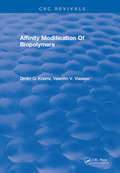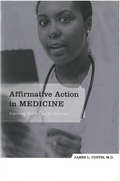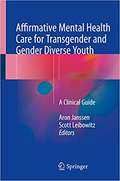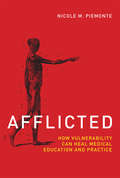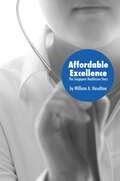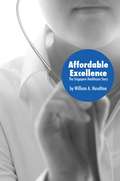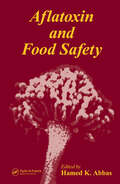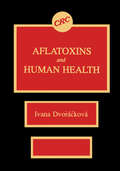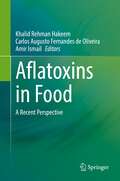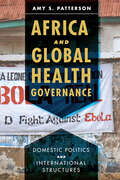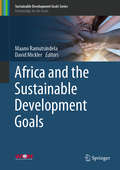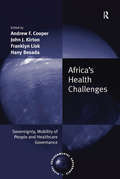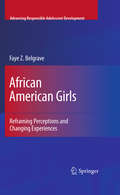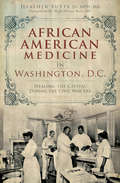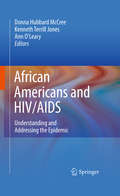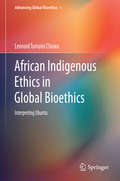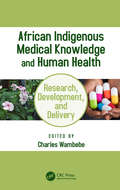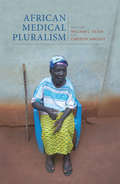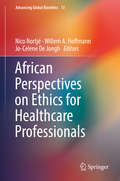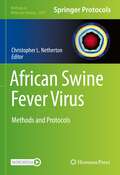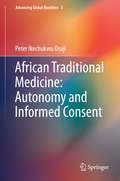- Table View
- List View
Affinity Modification Of Biopolymers
by Dmitri G KnorreThe goal of this book is to give a systematic description of the main principles of affinity modification and applications, consideration of possibilities, and restrictions of the method. Modification within specific complexes is a special case of chemical modification which is widely used in the nonaddressed version in biochemistry and related areas. Therefore, we have included in the first introductory paper chapter of the book general considerations of chemical modifications of biopolymers and the application of biopolymers.
Affirmative Action in Medicine: Improving Health Care for Everyone
by James L. CurtisAffirmative action programs have significantly changed American medicine for the better, not only in medical school admissions and access to postgraduate training but also in bringing a higher quality of health care to all people. James L. Curtis approaches this important transition from historical, statistical, and personal perspectives. He tells how over the course of his medical education and career as a psychiatrist and professor--often as the first or only African American in his cohort--the status of minorities in the medical professions grew from a tiny percentage to a far more equitable representation of the American population. Advancing arguments from his earlier book, Blacks, Medical Schools, and Society, Curtis evaluates the outcomes of affirmative action efforts over the past thirty years. He describes formidable barriers to minority access to medical-education opportunities and the resulting problems faced by minority patients in receiving medical treatment. His progress report includes a review of two thousand minority students admitted to U. S. medical schools in 1969, following them through graduation and their careers, comparing them with the careers of two thousand of their nonminority peers. These samples provide an important look at medical schools that, while heralding dramatic progress in physician education and training opportunity, indicates much room for further improvement. A basic hurdle continues to face African Americans and other minorities who are still confined to segregated neighborhoods and inferior school systems that stifle full scholastic development. Curtis urges us as a nation to develop all our human resources through an expansion of affirmative action programs, thus improving health care for everyone. James L. Curtis is Clinical Professor Emeritus of Psychiatry, Columbia University College of Physicians and Surgeons.
Affirmative Counseling and Psychological Practice with Transgender and Gender Nonconforming Clients
by Anneliese A. Singh Lore M. DickeyFewer than 30% of psychologists report familiarity with transgender and gender nonconforming (TGNC) clients' needs, which indicates a large gap in knowledge, skill, and competence in this area of practice. This volume provides mental health practitioners with theory-driven strategies for affirmative practice with TGNC clients of different ages, ethnicities, sexual orientations, and religious backgrounds.
Affirmative Mental Health Care for Transgender and Gender Diverse Youth: A Clinical Guide
by Aron Janssen Scott LeibowitzSimulates a range of complexity in the clinical cases to mirror real life examples.<P><P> Discusses the potential associations between gender identity and gender expression and co-occurring psychiatric conditions and how to tease them apart.<P> Written by experts in the field.<P>This unique resource offers an in-depth, comprehensive look at different types of mental health needs of transgender and gender diverse youth, how these intersect with gender identity, gender expression, and sexual orientation, and provides practical information on how to ethically, responsibly, and sensitively care for these patients.<P> Affirmative Mental Health Care for Transgender and Gender Diverse Youth: A Clinical Guide begins with three introductory chapters which contain practical information regarding assessment, psychological interventions, and the potential medical and surgical interventions that are indicated for youth with gender identity concerns. The remaining chapters are illustrated by multiple cases build around overarching chapter themes. Each case chapter opens with broad questions applicable to clinical practices, while the cases themselves focus on a particular co-occuring mental health condition. The case chapters are structured with intersectionality in mind, including elements of ethnic, racial, and cultural diversity, and the patients range over the full developmental spectrum, from pre-pubertal children to older adolescents. Chapter cases range in complexity as well, to provide readers with the tools they need to evaluate patients, and to assist in the decision of which presenting factors to prioritize in treatment at which time. Ending each chapter are clinical take-home messages, closing with additional practical knowledge that can be applied to other cases providers may see in their own practices.<P> Written by expert clinicians in the field, Affirmative Mental Health Care for Transgender and Gender Diverse Youth: A Clinical Guide is an ideal resource not only for child and adolescent psychiatrists, but for clinicians across all mental health disciplines working with gender non-conforming youth, and who are interested in providing informed, affirmative, and intersectional care.
Afflicted: How Vulnerability Can Heal Medical Education and Practice (Basic Bioethics)
by Nicole M. PiemonteHow medical education and practice can move beyond a narrow focus on biological intervention to recognize the lived experiences of illness, suffering, and death.In Afflicted, Nicole Piemonte examines the preoccupation in medicine with cure over care, arguing that the traditional focus on biological intervention keeps medicine from addressing the complex realities of patient suffering. Although many have pointed to the lack of compassion and empathy in medical practice, few have considered the deeper philosophical, psychological, and ontological reasons for it. Piemonte fills that gap, examining why it is that clinicians and medical trainees largely evade issues of vulnerability and mortality and, doing so, offer patients compromised care. She argues that contemporary medical pedagogy and epistemology are not only shaped by the human tendency to flee from the reality of death and suffering but also perpetuate it. The root of the problem, she writes, is the educational and institutional culture that promotes reductionist understandings of care, illness, and suffering but avoids any authentic confrontation with human suffering and the fear and self-doubt that can come with that confrontation. Through a philosophical analysis of the patient-practitioner encounter, Piemonte argues that the doctor, in escaping from authentic engagement with a patient who is suffering, in fact “escapes from herself.”Piemonte explores the epistemology and pedagogy of medicine, examines its focus on calculative or technical thinking, and considers how “clinical detachment” diminishes physicians. She suggests ways that educators might cultivate the capacity for authentic patient care and proposes specific curricular changes to help students expand their moral imaginations.
Affliction: Health, Disease, Poverty (Forms of Living)
by Veena DasAffliction inaugurates a novel way of understanding the trajectories of health and disease in the context of poverty. Focusing on low-income neighborhoods in Delhi, it stitches together three different sets of issues.First, it examines the different trajectories of illness: What are the circumstances under which illness is absorbed within the normal and when does it exceed the normal—putting resources, relationships, and even one’s world into jeopardy?A second set of issues involves how different healers understand their own practices. The astonishing range of practitioners found in the local markets in the poor neighborhoods of Delhi shows how the magical and the technical are knotted together in the therapeutic experience of healers and patients. The book asks: What is expert knowledge? What is it that the practitioner knows and what does the patient know? How are these different forms of knowledge brought together in the clinical encounter, broadly defined? How does this event of everyday life bear the traces of larger policies at the national and global levels?Finally, the book interrogates the models of disease prevalence and global programming that emphasize surveillance over care and deflect attention away from the specificities of local worlds. Yet the analysis offered retains an openness to different ways of conceptualizing “what is happening” and stimulates a conversation between different disciplinary orientations to health, disease, and poverty.Most studies of health and disease focus on the encounter between patient and practitioner within the space of the clinic. This book instead privileges the networks of relations, institutions, and knowledge over which the experience of illness is dispersed. Instead of thinking of illness as an event set apart from everyday life, it shows the texture of everyday life, the political economy of neighborhoods, as well as the dark side of care. It helps us see how illness is bound by the contexts in which it occurs, while also showing how illness transcends these contexts to say something about the nature of everyday life and the making of subjects.
Affordable Excellence
by William A. HaseltineThis is the story of the Singapore healthcare system: how it works, how it is financed, its history, where it is going, and what lessons it may hold for national health systems around the world. Singapore ranks sixth in the world in healthcare outcomes, yet spends proportionally less on healthcare than any other high-income country. This is the first book to set out a comprehensive system-level description of healthcare in Singapore, with a view to understanding what can be learned from its unique system design and development path.The lessons from Singapore will be of interest to those currently planning the future of healthcare in emerging economies, as well as those engaged in the urgent debates on healthcare in the wealthier countries faced with serious long-term challenges in healthcare financing. Policymakers, legislators, public health officials responsible for healthcare systems planning, finance and operations, as well as those working on healthcare issues in universities and think tanks should understand how the Singapore system works to achieve affordable excellence.
Affordable Excellence: The Singapore Health System
by William A. HaseltineThis is the story of the Singapore healthcare system: how it works, how it is financed, its history, where it is going, and what lessons it may hold for national health systems around the world. Singapore ranks sixth in the world in healthcare outcomes, yet spends proportionally less on healthcare than any other high-income country. This is the first book to set out a comprehensive system-level description of healthcare in Singapore, with a view to understanding what can be learned from its unique system design and development path.The lessons from Singapore will be of interest to those currently planning the future of healthcare in emerging economies, as well as those engaged in the urgent debates on healthcare in the wealthier countries faced with serious long-term challenges in healthcare financing. Policymakers, legislators, public health officials responsible for healthcare systems planning, finance and operations, as well as those working on healthcare issues in universities and think tanks should understand how the Singapore system works to achieve affordable excellence.
Affordable Excellence: The Singapore Healthcare Story
by William A. HaseltineThis is the story of the Singapore healthcare system: how it works, how it is financed, its history, where it is going, and what lessons it may hold for national health systems around the world. Singapore ranks sixth in the world in healthcare outcomes, yet spends proportionally less on healthcare than any other high-income country. This is the first book to set out a comprehensive system-level description of healthcare in Singapore, with a view to understanding what can be learned from its unique system design and development path.The lessons from Singapore will be of interest to those currently planning the future of healthcare in emerging economies, as well as those engaged in the urgent debates on healthcare in the wealthier countries faced with serious long-term challenges in healthcare financing. Policymakers, legislators, public health officials responsible for healthcare systems planning, finance and operations, as well as those working on healthcare issues in universities and think tanks should understand how the Singapore system works to achieve affordable excellence.
Affordable Excellence: The Singapore Healthcare Story - How to Create and Manage Sustainable Healthcare Systems
by William A. HaseltineThe United States has been struggling with its health care system for decades. Costs continue to spiral upward, while coverage of the population has decreased because of job losses and the resultant loss of health benefits, due to the Great Recession and the subsequent slow economic recovery. President Clintons attempt to enact a national health care plan failed, and the fate of President Obamas health care plan, under attack since its inception, is uncertain. Since achieving independence, Singapore undertook the monumental task of transforming itself to a modern, prosperous, secure city-state. Many institutions needed to be erected to reach this goal, but one that stands out and is the subject of this book was the need for a world class health care system. "Affordable Excellence" examines how Singapore succeeded in its efforts, setting up a health system that has become one of the best in the world, delivering high quality care at a fraction of the cost of most First World systems. Ranked 6th globally on performance, Singapore spends less than 4% of GDP on health care (in contrast to the U. S. , for example, which spends over 17% of GDP). How did Singapore do it? What can be learned from its achievement? What lessons can be put to use by the developing, and the most-developed, nations building new health care systems? This book provides answers. It explores the underlying social philosophy and basic approach that Singapore used to set up its system and, at the heart of the Singapore model, its system of health savings accounts and insurance programs that ensure no one would be without the means to buy quality care.
Aflatoxin and Food Safety
by Hamed K. AbbasAflatoxins are responsible for damaging up to 25% of the world's food crops, resulting in large economic losses in developed countries and human and animal disease in under-developed ones. In addition to aflatoxins, the presence of other mycotoxins, particularly fumonisins, brings additional concerns about the safety of food and field supplies. The
Aflatoxins & Human Health
by Ivana DvorackovaThis up-to-date reference includes the most recent available data and detailed case studies concerning the potential health risks of aflatoxin in the human population. It covers everything from acute toxic effects of aflatoxin in men to original observations concerning occupational health hazards due to aflatoxin exposure via the respiratory tract.
Aflatoxins in Food: A Recent Perspective
by Khalid Rehman Hakeem Carlos A. F. Oliveira Amir IsmailMycotoxins are the metabolites of fungus and are reported to contaminate nearly 25% of the food produced worldwide. The mycotoxins of most significance are the aflatoxins due to their severe health implications and their prevalence in food commodities on a larger scale. Aflatoxins are produced by certain species of fungi the most prominent among which are Aspergillus flavus, A. parasiticus and A. nominous. Food commodities of African and South Asian countries are especially reported to have aflatoxins well beyond the allowable limits but due to the global trade of food commodities developed countries are also prone towards the perils of aflatoxins. Moreover, climate changes may have a substantial impact on the distribution and global prevalence of aflatoxins in the near future.The International Agency for Research on Cancer (IARC) has classified the aflatoxins as group 1 category carcinogen. Aflatoxins are also reported as teratogenic, mutagenic, growth retardant, immunosuppressant and may also cause nervous system and reproductive system disorders. Preventive approaches involving good manufacturing from “farm to fork” are the major focus of the current food industry.The aim of our book is to provide readers with the most recent data and up-to-date studies from aflatoxins research, with specific focuses on (i) the impact of aflatoxins on human health, (ii) new approaches by the researchers from different parts of the world to degrade aflatoxins and (iii) potential preventive approaches that can significantly lessen the burden of aflatoxins in food products
Africa and Global Health Governance: Domestic Politics and International Structures
by Amy S. PattersonA timely inquiry into how domestic politics and global health governance interact in Africa.Global health campaigns, development aid programs, and disaster relief groups have been criticized for falling into colonialist patterns, running roughshod over the local structure and authority of the countries in which they work. Far from powerless, however, African states play complex roles in health policy design and implementation. In Africa and Global Health Governance, Amy S. Patterson focuses on AIDS, the 2014–2015 Ebola outbreak, and noncommunicable diseases to demonstrate why and how African states accept, challenge, or remain ambivalent toward global health policies, structures, and norms.Employing in-depth analysis of media reports and global health data, Patterson also relies on interviews and focus-group discussions to give voice to the various agents operating within African health care systems, including donor representatives, state officials, NGOs, community-based groups, health activists, and patients. Showing the variety within broader patterns, this clearly written book demonstrates that Africa's role in global health governance is dynamic and not without agency. Patterson shows how, for example, African leaders engage with international groups, attempting to maintain their own leadership while securing the aid their people need. Her findings will benefit health and development practitioners, scholars, and students of global health governance and African politics.
Africa and the Sustainable Development Goals (Sustainable Development Goals Series)
by Maano Ramutsindela David MicklerThe book draws upon the expertise and international research collaborations forged by the Worldwide Universities Network Global Africa Group to critically engage with the intersection, in theory and practice, of the Sustainable Development Goals (SDGs) and Africa’s development agendas and needs. Further, it argues that – and demonstrates how – the SDGs should be understood as an aspirational blueprint for development with multiple meanings that are situated in dynamic and contested terrains. As the SDGs have substantial implications for development policy and resourcing at both the macro and micro levels, their relevance is not only context-specific but should also be assessed in terms of the aspirations and needs of ordinary citizens across the continent. Drawing on analyses and evidence from both the natural and social sciences, the book demonstrates that progress towards the SDGs must meet demands for improving human well-being under diverse and challenging socio-economic, political and environmental conditions. Examples include those from the mining industry, public health, employment and the media. In closing, it highlights how international collaboration in the form of research networks can enhance the production of critical knowledge on and engagement with the SDGs in Africa.
Africa's Health Challenges: Sovereignty, Mobility of People and Healthcare Governance (Global Environmental Governance)
by Hany Besada Andrew F. Cooper John J. Kirton Franklyn LiskThis volume addresses the ideational and policy-oriented challenges of Africa’s health governance due to voluntary and involuntary cross-border migration of people and diseases in a growing 'mobile Africa'. The collected set of specialized contributions in this volume examines how national and regional policy innovation can address the competing conception of sovereignty in dealing with Africa’s emerging healthcare problems in a fast-paced, interconnect world.
African American Girls: Reframing Perceptions and Changing Experiences (Advancing Responsible Adolescent Development)
by Faye Z. BelgraveThe teenage years can be exciting for girls, as they develop into young women and anticipate their future. For some, however, this developmental stage may be tempered by increased risks for teen pregnancy, school failure, and some health problems. African American Girls: Reframing Perceptions and Changing Experiences explores not only the challenges and stressors confronting this unique population, but also the strengths and resiliencies used to meet them. Examining prevailing trends while avoiding simplistic generalizations, the book is both descriptive (e.g., explaining similarities and differences with girls of other ethnicities and African-American boys in critical areas) and useful (e.g., providing concrete guidelines for professionals working to support prosocial development and prevent risky behaviors). This unique volume: addresses salient issues of self and identity, examines crucial domains, such as relationships, achievements and expectations, and issues that have a major impact on health and well-being, offers practical recommendations and resources for working with African-American girls during the period when life experiences and decisions are most likely to affect adult outcomes, discusses the lives of girls from diverse families, communities, and circumstances, explores the influences of family, peers, community, and cultural traditions, features sample activities for promoting positive development and includes quotations reflecting the perspectives of the girls in their own words. African American Girls is an essential resource for a wide range of professionals, including clinical, child, and school psychologists, counselors, therapists, and social workers. Whether one's specialty is prevention, intervention, education, or research, this book is a must-have volume.
African American Medicine in Washington, D.C.: Healing the Capital During the Civil War Era
by Heather ButtsThe true story of the black doctors and nurses who tended to Civil War soldiers in the capital. Just as African Americans fought in defense of the Union during the Civil War, African American nurses, doctors, and surgeons worked to heal those soldiers. In the nation&’s capital, these brave healthcare workers created a medical infrastructure for African Americans, by African Americans. Preeminent surgeon Alexander T. Augusta fought discrimination, visited President Lincoln, testified before Congress, and aided the war effort. Washington&’s Freedmen&’s Hospital was formed to serve the District&’s growing free African American population, eventually becoming the Howard University Medical Center. These physicians would form the National Medical Association, the largest and oldest organization representing African American doctors and patients. This book recounts the heroic lives and work of Washington&’s African American medical community during the Civil War.
African Americans and HIV/AIDS: Understanding and Addressing the Epidemic
by Ann O'Leary MPH Msw Kenneth Terrill Jones Donna Hubbard Mccree RphThe HIV/AIDS epidemic is burgeoning among African American men and women. Despite comprising only 13% of the population, 50% of new HIV diagnoses in 2004 were among African Americans. Among women and men who have sex with men (MSM), African Americans are grossly disproportionately affected by this epidemic, and this trend shows no sign of abating. This book seeks to explore some of the contextual factors that contribute to this disparity as well as ways to intervene to slow the growth of the epidemic in the U.S. This volume will focus on the history and context of HIV/AIDS in African Americans and interventions targeting specific sub-populations including adolescents, heterosexual men and women, men who have sex with men, incarcerated populations, and injection drug users. Context chapters will focus on specific contextual and structural issues related to HIV/AIDS transmission and prevention in African Americans including disparities in incarceration, racism, economic issues and substance abuse. Intervention chapters will focus on best-evidence and promising-evidence based interventions targeting HIV prevention in African Americans. These chapters will address the latest in intervention strategies, program evaluation, cost effectiveness and qualitative research methods and will include risk reduction, risk assessment, and testing and counseling.
African Indigenous Ethics in Global Bioethics: Interpreting Ubuntu (Advancing Global Bioethics #1)
by Leonard Tumaini ChuwaThis book educates whilst also challenging the contemporary schools of thought within philosophical and religious ethics. In addition, it underlines the fact that the substance of ethics in general and bioethics/healthcare ethics specifically, is much more expansive and inclusive than is usually thought. Bioethics is a relatively new academic discipline. However, ethics has existed informally since before the time of Hippocrates. The indigenous culture of African peoples has an ethical worldview which predates the western discourse. This indigenous ethical worldview has been orally transmitted over centuries. The earliest known written African text containing some concepts and content of ethics is the "Declaration of Innocence" written in 1500 B. C. , found in an Egyptian text. Ubuntu is an example of African culture that presents an ethical worldview. This work interprets the culture of Ubuntu to explain the contribution of a representative indigenous African ethics to global bioethics. Many modern scholars have written about the meaning of Ubuntu for African societies over centuries. Some scholars have viewed Ubuntu as the greatest contribution of African cultures to other world cultures. None of the scholars, however has explored the culture of Ubuntu as providing a representative indigenous ethics that can contribute to global bioethics as discussed in this book.
African Indigenous Medical Knowledge and Human Health
by Charles WambebeDespite the relevance of and empirical evidence for African Traditional Medicine, based on African Indigenous Medical Knowledge (AIMK), research and development of new phytomedicines from this continent has been slow. African Indigenous Medical Knowledge and Human Health aims to provide a catalyst for health innovations based on the rich African biodiversity and AIMK. The book documents some of the success stories from the continent related to AIMK and serves as a one-step reference for all professionals interested in the research and development of medical interventions - including pharmacognosists, ethnobiologists, botanists, phytochemists, pharmacologists and medical scientists.
African Medical Pluralism
by William C. Olsen Carolyn SargentIn most places on the African continent, multiple health care options exist and patients draw on a therapeutic continuum that ranges from traditional medicine and religious healing to the latest in biomedical technology. The ethnographically based essays in this volume highlight African ways of perceiving sickness, making sense of and treating suffering, and thinking about health care to reveal the range and practice of everyday medicine in Africa through historical, political, and economic contexts.
African Perspectives on Ethics for Healthcare Professionals (Advancing Global Bioethics #13)
by Nico Nortjé Willem A. Hoffmann Jo-Celene De JonghThis book focuses on ethical issues faced by a variety of healthcare practitioners across the Anglophone African continent. This important resource contains in-depth discussions of the most salient current ethical issues by experts in various healthcare fields. Each profession is described from both an African and a South African perspective, and thus contributes to dialogue and critical thinking around African ethics and decision-making. In this way the book provides readers with an understanding of the ethical issues at hand in various professions, including the practical implications of the ethical issues and how to address those effectively. This is a beneficial resource for all those involved in the various healthcare professions addressed in this book, including undergraduate students, lecturers, researchers and practitioners across the continent. Simply put, with the dynamic changes and challenges in healthcare across the globe and in Africa, this is an indispensable resource for healthcare practitioners.
African Swine Fever Virus: Methods and Protocols (Methods in Molecular Biology #2503)
by Christopher L. NethertonThis volume provides a compilation of methods that will aid researchers studying virology, immunology, and vaccinology of this devastating disease of swine. Written in the format of the highly successful Methods in Molecular Biology series, each chapter includes an introduction to the topic, lists necessary materials and reagents, includes tips on troubleshooting and known pitfalls, and step-by-step, readily reproducible protocols. Authoritative and cutting-edge, African Swine Fever Virus: Methods and Protocols aims to be a foundation for future studies and to be a source of inspiration for new investigations in the field.
African Traditional Medicine: Autonomy And Informed Consent (Advancing Global Bioethics #3)
by Peter Ikechukwu OsujiThis book focuses on informed consent in African Traditional Medicine (ATM). ATM forms a large portion of the healthcare systems in Africa. WHO statistics show that as much as 80% of the population in Africa uses traditional medicine for primary health care. With such a large constituency, it follows that ATM and its practices should receive more attention in bioethics By comparing the ethics of care approach with the ATM approach to Relational Autonomy In Consent (RAIC), the authors argue that the ATM focus on consent based on consensus constitutes a legitimate informed consent. This book is distinctive insofar as it employs the ethics of care as a hermeneutic to interpret ATM. The analysis examines the ethics of care movement in Western bioethics to explore its relational approach to informed consent Additionally, this is the first known study that discusses healthcare ethics committees in ATM.
